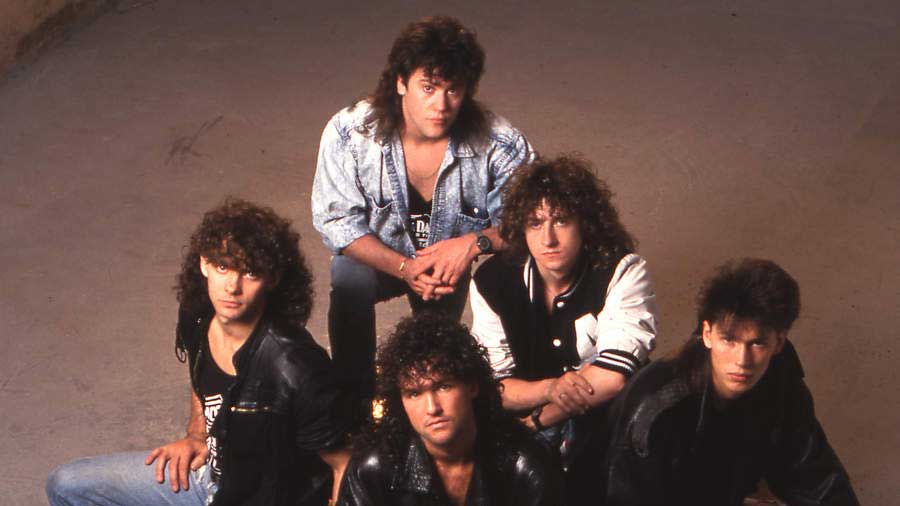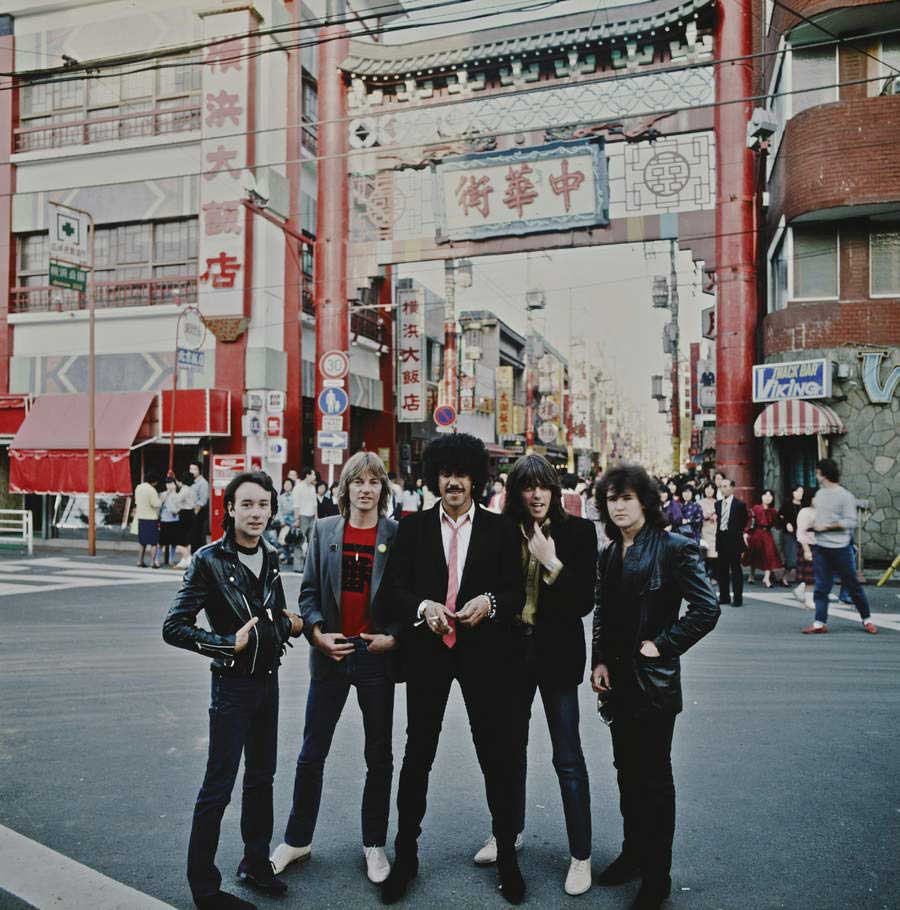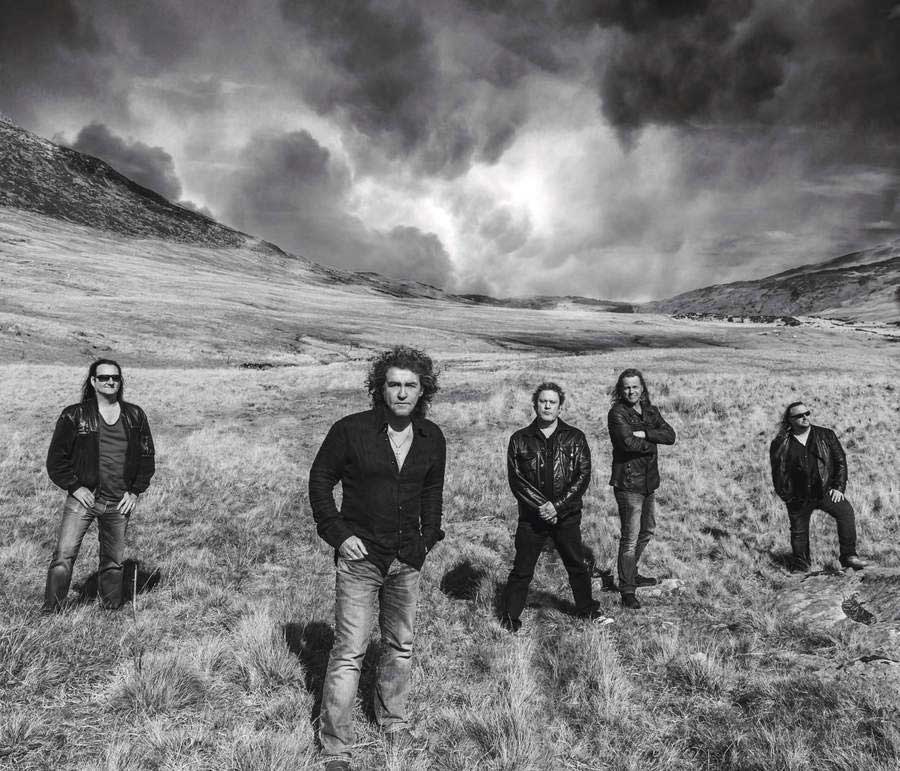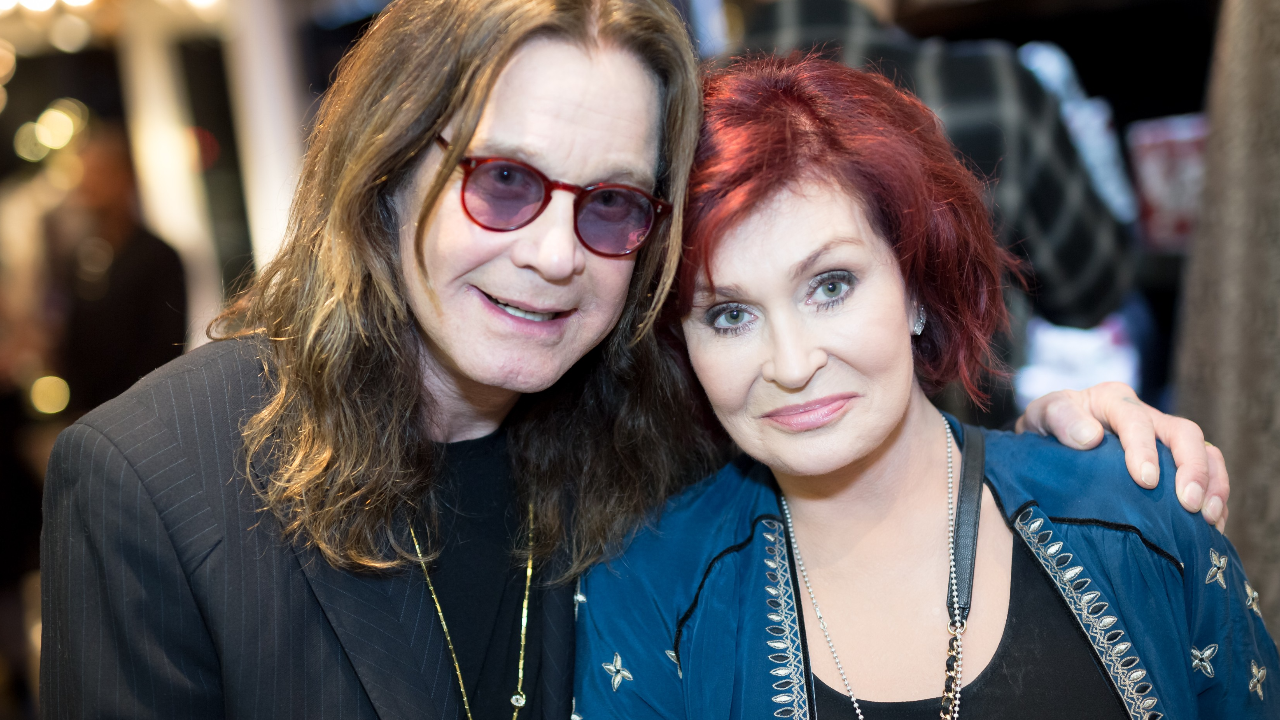Dare: "It isn't easy to keep on going. But I live and breathe this music"
The story of Dare, featuring tales of Thin Lizzy, changes of direction, terrible timing, record company shenanigans, and Professor Brian Cox

Although Dare’s sound stabilised at the end of the 90s, the Oldham-based band spent the first few years of their career building expectations, only to then go and knock them down again.
Following leader, frontman and keyboard player Darren Wharton’s two-year spell as a member of Thin Lizzy, in 1988 Dare emerged with their debut Out Of The Silence – still talked of in hushed tones within AOR circles – only to then reinvent themselves as an altogether harder-rocking beast with follow-up Blood From Stone.
It was 1991, and the band’s label, A&M, craved their own equivalent of Guns N’ Roses or Whitesnake. This enforced change in direction would ultimately sink the first incarnation of Dare, although Wharton maintains that they never broke up. Then with their third album they took another sharp left turn. With Wharton surrounded by a new set of faces, 1998’s Calm Before The Storm was full of the music that really moved him: atmospheric, Celtic-infused melodies, delivered in emotional tones.
Talking to Classic Rock for our very first issue, in 1998, Wharton insisted: “When I go into HMV I don’t want to be filed under ‘heavy metal’ any more. I want to be in with Pink Floyd and Genesis.”
Nearly a quarter of a century later, with their recently released Road To Eden, Dare’s tenth album, that sentiment hasn’t changed a bit.

Wharton had joined Lizzy at just 18, so the band’s dissolution came as a shock.
“We said goodbye at the airport after a tour and it felt like a break, that we’d be back,” he recalls. “But then Phil [Lynott] got Grand Slam together and I realised that we were semi-broken up.”
Sign up below to get the latest from Classic Rock, plus exclusive special offers, direct to your inbox!
He moved from London back to Oldham and began the search for musicians, initially dabbling with a solo career, and signed a deal with Phonogram. This would put him out of the running when he was approached to play keyboards on Whitesnake’s 1987 album.
“I got a call from [Whitesnake guitarist] John Sykes when they were recording in Germany,” he rues, “but my solo deal made it impossible.”
The equally fresh-faced guitarist Vinny Burns, then on a bit of a Gary Moore trip, was a recommendation. And when an incognito Wharton went to check him out playing covers of Empty Rooms and Parisienne Walkways in a local pub he was blown away.
“When Daz [Wharton] called me I thought it was one of my mates winding me up,” Burns says now, laughing. “But half an hour later we were sitting together in a pub and within a week we had formed a band.”
“The chemistry was instant,” Wharton says. “We both liked the same music and enjoyed a pint, and a month and a half later we had written most of Out Of The Silence.”

With a line-up completed by bassist Martin ‘Shelley’ Shelton, keyboard player Brian Cox (today a professor and TV presenter) and drummer James Ross, the group started playing live. For first-time lead vocalist it was tough for Wharton, who at first largely sang while behind banks of hardware, and playing a keytar for the set’s rowdier moments. After finding a manager, Keith Aspden (who also represented Talk Talk), in early 1987 Dare were thrilled to find themselves in the midst of a bidding war.
“Keith brought the heads of six or seven labels up to Oldham to see us play a gig at a squash club,” Wharton remembers. “We got five offers that night, and eventually went with A&M.”
Dare were dispatched to California, where they recorded with producers Mike Shipley and Larry Klein at a studio owned by Joni Mitchell. Little did they, or anyone else, of course, know, but the likes of Def Leppard, Guns N’ Roses and Aerosmith were about to take over the planet.
“While we were over there, everything changed,” Burns reflects today. “A&M had put us with Mike Shipley, who had just done Whitesnake and the Scorpions, but we could feel everything shifting. We made that album a year too late.”
“Mike Shipley had worked with Mr Mister and Def Leppard, so maybe it’s a little too clean-sounding,” Wharton adds. “It could have been a bit rawer, but to me it’s still a wonderful album.”
Although Out Of The Silence delivered three lower-level hits – Abandon, Nothing Is Stronger Than Love and The Raindance – progress was tough.
“I remember hearing Steve Wright play us on Radio 1, but I was particularly upset that Piccadilly Radio, Manchester’s local station, wouldn’t play us,” Wharton says. “We soon realised how hard it is for a young band to gain acceptance.”
Neither did the rock press know what to make of Dare. “Phil Wilding became a mate of mine, but his review of the album in Kerrang! said I sang like a strangled cat,” Wharton continues, laughing. “He might have had a point.” (In fact, Jon Hotten reviewed the album in K!, stating: ‘Dare are there to be awed, AOR fans will lap it up’ – Ed.)
A&M were about to ramp up the pressure on the fledgling singer, demanding that he put aside playing keyboards to focus on fronting the show. His first gig standing centre-stage was in front of 12,000 people in Sweden as guests of Europe. (This was one of several high-profile tours, others included ones with Jimmy Page and Gary Moore).
“I was absolutely terrified,” Wharton admits. “It was something I really didn’t want to do. But I had spent time watching videos of David Coverdale or whoever and borrowing the moves I liked, and I’d practise them in front of the mirror.”
That change presented Brian Cox with the space to flourish. Wharton and Burns both speak highly of the keyboard player, whose head they say was always buried in a book by the noted American physicist Richard Feynman when they were on tour.
“We had grabbed Brian when he had a year out on the way to university,” Burns explains, while Wharton says nostalgically: “On the bus Brian and I had some fascinating conversations about space and the possibility of alien life. I have very fond memories of those couple of years he was in the band."
By this time, however, the proverbial shit was about to hit the fan. Determined to place Dare among the big-haired hard rockers of the early 1990s, A&M brought in the in-demand Keith Olsen to produce their second album, Blood From Stone.
“Keith had just done Whitesnake [1987] and the Scorpions [Crazy World], but it was a wrong decision for two reasons,” Wharton says. “Firstly, I wasn’t the kind of singer for that music. Secondly, it wasn’t where our hearts lay. Blood From Stone would have been an awesome album with David Coverdale singing it. I should have known better, but we were young and pushed into a corner. I wish that we had stuck to our guns.”
“There are so few keyboards on Blood From Stone,” Burns marvels. “There should have been a logical progression, but it kind of felt like the band had skipped an album.”
Once again Dare scored a couple of minor hits, with We Don’t Need A Reason and Real Love, but most rock fans saw through what was going on. Dare were also no fools.
“With Blood From Stone we knew we’d have to shift two million albums just to break even, so the writing was on the wall,” Burns states.
“I’d had a conversation with our manager, who’d said A&M was being sold as a company and that we were unlikely to make a third album with them,” says Wharton. “But the band didn’t break up. It is true that Vin and I had a falling out in Germany one night, but losing a record deal is never easy, especially when you feel you have something left to give.”
Burns went on to play with Asia, Ten, Ultravox and others. Meanwhile, a demoralised Wharton moved to North Wales, where he met a young guitarist called Richard Dews. At around the same time, Wharton was invited to be a part of a Thin Lizzy reunion.
“I prefer to call it a tribute, because there can be no Thin Lizzy without Phil,” he explains, keen to make the distinction. “But Scott [Gorham, guitar] and John Sykes decided to do a run of dates, and I joined them. In my view, nobody but Scott and Brian [Downey, drums], along with John and myself, has the right to play those songs, and at the end of the day people still want to hear them. That’s how I feel.”

Although he has no clue how it happened, Wharton’s demos fell into the hands of German label MTM Records, who were sufficiently impressed to release them as the third Dare album, Calm Before The Storm, in 1998.
“I think we got ten grand at the most from that, but it allowed me to buy a digital desk and build my own studio,” Wharton says. “Rather than pay to hire a producer, I bought books on how to do it myself. The album sounded horrible, but the songs were great, and gradually I learned how to do it.”
Dare recorded two more albums for MTM (2001’s Belief and 2004’s Beneath The Shining Water) before taking the plunge to launch what Wharton freely acknowledges as a cottage industry.
“I set up my own label, Legend Records, and got a bank loan to buy another desk – a better one. Dare was back up and running again,” he adds proudly.
But it’s a new and fundamentally different Dare. “The current sound has much more of a Celtic vibe,” Wharton agrees. “Incredibly, we got on Radio 2; Terry Wogan absolutely loved Belief.
“I look at bands like Pink Floyd and Dire Straits with admiration because they just do what they do,” he adds. “I want to break those chains of the past.”
Nevertheless, the returns of Burns and Nigel Clutterbuck (Dare’s second bass player) in 2008 and ’14 respectively have gradually restored some of those links. Released back in April, Road To Eden, their tenth album, offers their best blend yet of old and new – specifically its rousing opener Born In The Storm and the final track, Thy Kingdom Come, which features an epic solo from Burns.
“We wanted to write an album that would be fun to play live,” Wharton says. “With that extra level of guitars that comes from Vinny, some of the aggressiveness is back.”
Although it will never be enough for Dare fans who still hanker after a full album of AOR-meets-pomp majesty, the band don’t lose sleep over managing such expectations.
“We won’t make another album in the style of Out Of The Silence,” Burns comments. “If we did, everyone would see it as a cynical ploy.”
They didn’t make another album like Out Of The Silence, but in 2018 the band recorded a new version of it, although that was for entirely different reasons.
“We don’t get a penny from that album, nor from Blood From Stone – not a cent,” Wharton fumes, clearly aggrieved. “There was a plan for a label to remaster and re-release it, but thanks to Universal, who own it now, it all fell through. We still play three or four of those songs every night, and personally I feel that we should own our own music. So we made our own version of it.”
In another early interview with Classic Rock, Wharton proclaimed proudly: “It’s amazing what can be achieved through stubbornness.”
Today, it’s a credo that Dare continue to live by.
“I wouldn’t say stubbornness so much; we’re not trying to prove anyone wrong or anything,” Wharton shrugs. “And of course it’s true that it isn’t easy to keep on going. But I live and breathe this music. Sometimes I feel like throwing myself off a bridge, because writing songs is never simple, but our whole lives have been music.
“As for the people who try to tell us how our music should and shouldn’t sound, well… nobody knows Dare better than Vinny and me,” he concludes. “We are aware of the boundaries of what Dare can and should be, and we stick within them. And it seems to work pretty well."
Road To Eden is available now via Legend.

Dave Ling was a co-founder of Classic Rock magazine. His words have appeared in a variety of music publications, including RAW, Kerrang!, Metal Hammer, Prog, Rock Candy, Fireworks and Sounds. Dave’s life was shaped in 1974 through the purchase of a copy of Sweet’s album ‘Sweet Fanny Adams’, along with early gig experiences from Status Quo, Rush, Iron Maiden, AC/DC, Yes and Queen. As a lifelong season ticket holder of Crystal Palace FC, he is completely incapable of uttering the word ‘Br***ton’.
